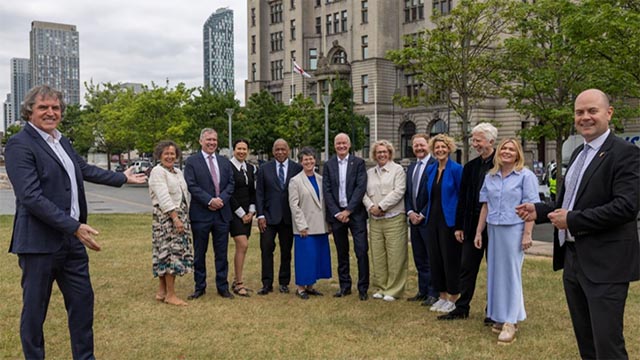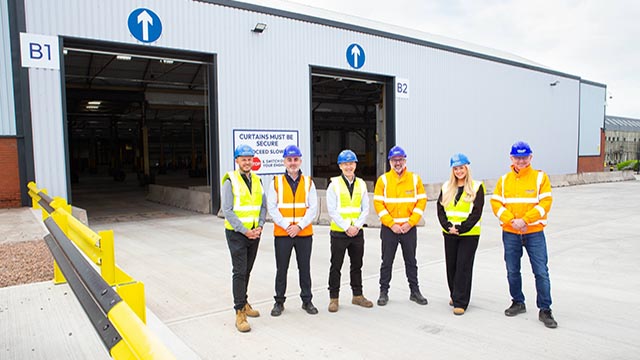LISTEN How does the sector solve a problem like social mobility? It is a question that is on the lips of many forwarding-thinking businesses within real estate, and one that many companies have been trying to solve through apprenticeship schemes.
But progress is slow, and after a year during which many businesses have had to pause or reduce their apprenticeship programmes, does real estate need a different approach?
EG sat down with Ros Goode (pictured), principal and managing director for London at Avison Young, for a recent episode of the EG Property Podcast to find out what the company was doing to help bring fresh talent into both the real estate and connected sectors.
Last March, Avison Young signed up to the Reskilling the Recovery campaign of the London Progression Collaboration, a jv between the Greater London Authority and think thank IPPR. The campaign was calling on large businesses to transfer at least £10,000 of unspent apprenticeship levies to small businesses in the capital to enable them to start new apprenticeship schemes.
Mobilising future leaders
With a reported £1bn in apprenticeship levies reportedly sitting unspent in businesses across the UK, the potential to make a difference is sizeable.
“It’s just so frustrating, because you’ve got so many young people out there who would love to find themselves going from school into the workplace, who wouldn’t contemplate going into higher education or don’t have access to higher education,” says Goode, adding that the numbers of potential future leaders that could be mobilised by a scheme like the London Progression Collaboration are immense.
She is calling on the whole of the real estate sector to look at their own levy pot to see if they can release some of its contents to enable apprenticeship schemes outside their businesses.
Any business that has a salary bill of more than £3m has to pay the levy, but many, says Goode, are unaware that they can transfer as much as 25% of their levy funds to smaller employers.
“It’s a great way to mobilise the pot, and it is just not very well known about,” she says. “It’s an ongoing capacity, so you can use that percentage of the pot year-on-year and put it in the hands of third parties.”
She adds: “Across our industry, we are talking about significant amounts of levy pot, which some businesses might not recognise they’ve got to the scale that they’ve got. It accumulates every year and it’s only there to be used for two years, then the Treasury takes it back. My request is: please, just look at what you’ve got, make these calls and start mobilising that pot.”
Overwhelmingly rewarding
Avison Young has funded three external apprentices as part of the programme in the hospitality and construction sectors. And for Goode the process has been overwhelmingly rewarding. While the company was unable to take on too many of its own apprentices, it was able to help smaller businesses give other young people a start in life.
However, while utilising an unspent levy pot for good is definitely to be encouraged, the industry also needs to be focusing on its own talent, diversity and inclusion issues, and finding ways to attract people who don’t take the traditional route into real estate.
“We are all, thankfully, so much more aware of social mobility agendas, and ever more so coming out of Covid,” says Goode. “I’m sure I will be speaking for others within the industry when I say that apprenticeship is a route we would all like to do better on.”
Goode says barriers to “doing better” include the fact that you can only use the levy pot for training, whereas where businesses really need the help is in wage costs, and the fact that there are far too many other mainstream routes into real estate.
The industry needs to “do a massive pivot” in the way that it approaches new routes into real estate, putting internships and apprenticeships at the centre of how it brings in new talent.
Goode would like to see the real estate sector mirror the accountancy sector, with a collaborative approach to talent acquisition.
She points to Access Accountancy, a collaboration of more than 25 professional services firms focused on providing access to accountancy as a profession to a much wider group of individuals. It was set up in 2014 to attract more applicants from lower socio-economic backgrounds and provides a single platform highlighting work experience opportunities across a range of firms, guidance on how to access the sector and the communication of sector-wide experiences from individuals who have taken part in the programme.
“I think this is the pivot that we need to be making as an industry,” says Goode. “We want to be able to say: great, let’s do an internship, and then be able to offer them not just a slot at Avison Young, but a slot over at L&G, at British Land and at Grosvenor, for example.”
She adds: “We, as players in the industry, need to come together a lot better on this. Everyone is doing great things individually, and I’m really proud of what we are doing with Avison Young on this, but imagine how much more powerful it would be to bring this together far more as a collective initiative.”
With a sector still fighting widespread misunderstanding in the perception of the wider public, it’s a challenge worth accepting.
To send feedback, e-mail samantha.mcclary@eg.co.uk or tweet @samanthamcclary or @EGPropertyNews











